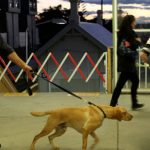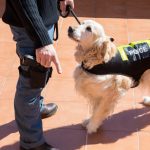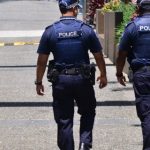Victoria Police May Get the Power to Search Without a Reason

Victoria police are pushing the Andrews government to expand police search powers at music festivals, so that officers are able to search patrons for drugs without having a reasonable suspicion to do so.
Police claim the powers are necessary to counter the spate of drug-related deaths across the state in recent months.
A few weeks ago, several people were rushed to hospital after suffering overdoses attributed to the party drug GHB at a night club in Melbourne’s CBD. Three drug-related deaths occurred in January after a deadly batch of ecstasy was sold at Chapel Street nightclubs. Another man lost his life at the Rainbow Serpent festival in the state’s northwest on January 28.
Under the Major Sporting Events Act, police currently have the power to search people without a ‘reasonable suspicion’ at events such as the Melbourne Cup and the AFL Grand Final. Police want to broaden the scope of this Act to include dance festivals and “bush doofs”.
Section 90 of the Act provides that authorised officers may request a person to “open for inspection and search… any bag, basket, or other receptacle” they intend to take into an event, as well as to turn out their pockets.
An unprecedented extension of powers
Former Victoria police senior sergeant Greg Denham explained that the powers provided to police under the Major Sporting Events Act were designed to eliminate potential terrorist threats at major events.
In his view, the implications of extending these powers to festivals is “very worrying,” in terms of “potentially causing greater risk” to those who partake in drugs, as it is likely to increase the chances of people ‘loading up’ on large quantities of drugs before arriving at events. “This really does extend way beyond any other measure police authorities have in terms of searching people.”
Mr Denham is the Australian representative of the US-based agency Law Enforcement Against Prohibition. LEAP is an international group of police officers and other members of the criminal justice system that want to see an end to drug prohibition.
According to Denham, the new powers also raise concerns over the profiling of the poor and racial minorities. “How do we determine or categorise people in term of raising a level of some suspicion?” he asked, adding that the powers would allow officers to search people for “very subjective reasons.”
To justify a search at present, police need to have a suspicion on reasonable grounds that a person may be carrying drugs or something else which is illegal or dangerous. The situation is similar in NSW.
Increasing drug-related harms at festivals
Victorian police minister Lisa Neville claims that the proposal is all about reducing harm at festivals. However, Denham points out that increased policing is likely to lead festivals goers to partake in more dangerous drug taking behaviours.
“We know that if people think they’re going to be searched by police – or the dogs are around – they will ingest drugs very quickly,” Mr Denham told Sydney Criminal Lawyers®. He added that there have been cases of people taking all of their drugs at once, which have “caused deaths in the past.”
The death of James Munro at Sydney’s Defqon 1 festival in 2013 is believed to have been a case of what is referred to as “panic overdosing.” Mr Munro is said to have taken a lethal amount of drugs on seeing a police drug detection dog operation at the festival.
True harm reduction
These days, Mr Denham is a leading harm reduction advocate. He points to pill testing as the option that should be taken to curb the harms associated with the use of drugs at festivals. “It’s badly needed in all states and territories,” he said.
Pill testing allows patrons to check the contents of their drugs at booths at music festivals, or at a High Street service in a nightclub precinct. Trained professionals take a minute sample of a substance, and check it with laboratory equipment.
The owner of a drug that has been tested can then make an informed decision about whether they want to ingest the substance in their possession.
This evidence-based approach has been utilised in countries across Europe for decades now. Indeed, the European Union has even produced pill testing best practice guidelines.
Cracking down on nightlife
Since April, Victoria police have increased their use of sniffer dogs in nightlife precincts and clubs around Melbourne under Operation Safenight.
With this, Mr Denham warns that there’s the potential that the new search powers could “be extended beyond music festivals to nightclubs and other venues.”
The High Alert campaign was formed in response to Operation Safenight by a group of concerned harm reduction advocates, health professional and legal practitioners.
Nevena Spirovska, co-founder of High Alert, says that since her group had started conducting street walks in St Kilda and Chapel Street on Saturday nights, police seem to have backed off on their search operations.
However, two weeks ago in the eastern suburb of Ringwood, police carried out a similar operation. It included “20 police officers and two dogs targeting the nightlife precinct there,” Spirovska reported. They searched “over a hundred patrons, and all in all, they made five arrests.”
High Alert is now broadening its scope to campaign against the new law enforcement proposal, Ms Spirovska said. She explained that the ‘reasonable suspicion’ requirement strikes a balance “between the needs of police to intervene… and the need to limit these powers over citizens.”
Time to take a different approach
Mr Denham made clear that while some people at music festivals consume drugs, most people who attend them “are just there to have a good time,” and festivals are “very safe places to go.”
“This is more a case of police frustration about not being able to win the war on drugs,” he remarked, “rather than some specific purpose around reducing drugs.”
As Denham has pointed out, a number of high ranking former police officers accept that the war on drugs has been lost, calling for a different approach which includes harm reduction measures such as pill testing. One of those officers is former Victoria police chief commissioner Ken Lay, who publicly stated “We can’t arrest our way out of this issue.”
As far as Denham is concerned, it’s time to acknowledge that people use illicit drugs, and make the environment they’re in safer. “Or we can just try to continue to arrest people and… hit our head against the wall expecting to get a different result, which we won’t”.







